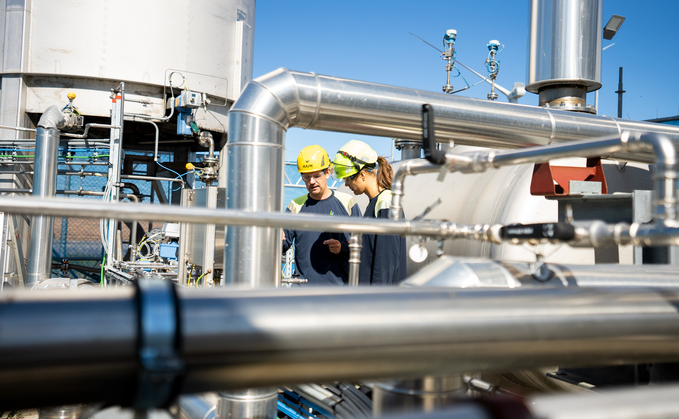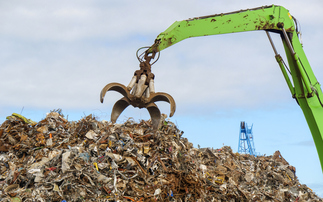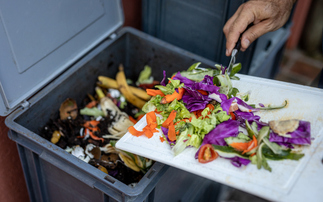
Credit: Viridor
The road to a circular economy requires leadership, innovation and collaboration, according to UK Green Business Awards 2025 sponsor Viridor
The UK's journey towards a circular economy must be built on more than just good intentions. It requires bold investment in the infrastructure that will underpin a circular economy. That was the clear message from the recent speech by Steve Reed, the UK's Secretary of State for the Environment, which reinforced the vital role waste and recycling infrastructure must play to build a circular economy and deliver growth.
The UK operates under a predominantly linear economy. Even with efforts to improve waste prevention, reuse, recycling and recovery, about 14 million tonnes of waste still ends up in landfill and another 10 million tonnes of waste is exported.
So, how can we move to a world where nothing goes to waste? Or, going further, how can we turn waste into worth?
Currently, despite significant progress, only about half of the UK's waste is recycled. More must be done, particularly when it comes to plastic recycling. That's why the Department for Environment, Food & Rural Affairs (Defra) is implementing a series of vitally important reforms to help achieve the government's ambitious 65 per cent recycling target by 2035.
Each year, UK households throw away 90 billion pieces of plastic. Traditional recycling systems have struggled to handle the full spectrum of plastic waste, particularly complex and contaminated plastics like flexible films, multi-layered packaging and compound cardboard and plastic packaging. Around 20 per cent of these materials end up in landfill, contributing to lasting impacts on the surrounding environment and loss of valuable resources.
Plastics also account for the overwhelming majority of fossil CO2 generated by energy-from-waste facilities. Recycling plastics diverts these materials away from energy-from-waste and drives down the demand for extraction of fossil fuels for virgin plastic manufacture. Plastics in energy-from-waste reduce the amount of waste the facility can process and increase the carbon emissions that will be subject to the Emissions Trading Scheme (ETS) and contribute to climate change.
Central to Defra's reform agenda is Enhanced Producer Responsibility (EPR), which came into force on 1 April 2025. EPR places the responsibility on packaging producers to fund the full net cost of recycling the materials they put on the market. This important reform should lead to significant behaviour and production changes that will remove plastic from non-recycled waste, but it's just one piece of the puzzle. Ending the disposal and export of plastic waste will require much more.
The circular economy cannot be achieved without large-scale infrastructure development, cutting-edge technology and strategic investment. This presents a critical opportunity for both the public and private sectors.
Research by Anthesis shows that increasing domestic recycling capacity to meet the UK's recycling target and ending plastic waste export is a £1bn green infrastructure and jobs opportunity. This investment would create over 40 large sorting and recycling plants, delivering over 2,000 jobs across the UK.
To unlock this potential, we need to remove investment barriers created by short-term contracts for recycling and volatile commodity prices. The short termism and volatility make it difficult to attract the long-term, stable investment needed to develop large-scale recycling infrastructure. Mechanisms like Contracts for Difference (CfD), for example, have proven successful in renewable energy and could provide the clarity needed to attract private sector investment.
Without these changes, the UK will struggle to meet its circular economy goals. The private sector cannot invest without the long-term certainty that the necessary infrastructure will be in place to support it. Therefore, alongside policy reforms, industry collaboration is crucial to ensuring that the UK remains on track toward achieving its net-zero and circular economy targets.
Equally, there must be investment in next-generation technologies that can recycle previously unmanageable plastic waste streams. While mechanical recycling has its place, it cannot handle the full range of plastic waste that we produce. This is where chemical recycling technologies, such as Plastics-to-Liquids (PtL), step in.
PtL converts waste plastics back into high-quality raw materials, including oils used in the production of new plastic products. This process directly displaces fossil-based feedstocks, contributing to a circular low-carbon economy. Our operational PtL facility in Skive, Denmark, is an example of how chemical recycling can create valuable products from end-of-life plastics, reducing reliance on virgin materials.
Since launching our Circular Economy Strategy in 2021, we have invested significantly in advanced recycling and EfW technologies. However, the journey is far from over. We are committed to scaling up our efforts and working alongside industry partners, government and NGOs to build a more connected and effective circular supply chain.
At the same time, we are advocating for systemic reforms to support recycling and improve the use of recycled content. We also recognise the growing importance of reuse in achieving a circular economy, and support measures that increase public access to reuse systems and infrastructure.
The road to a circular economy requires leadership, innovation and collaboration. Critically, it requires a supportive, long-term policy backdrop to translate the Secretary of State's circular economy vision into credible investable projects and turn waste into worth.
Viridor is the sponsor of the Net Zero Strategy of the Year award at the UK Green Business Awards 2025, which will take place on the evening of 11 June at The Brewery in London. You can reserve your place at the awards here.







